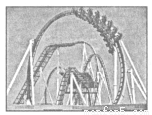题目内容
完形填空
阅读下面短文,从短文后各题所给四个选项(A、B、C和D)中,选出可以填入空白处的最佳选项,并在答题卡上将该项涂黑。
“Melting pot” means a place where people from many different racial groups or cultures form a united society. The idea comes from __________ metals in a container. When they melt, the metals ___________ and become something new and stronger. The _________ has been used to describe the United States as a nation created from people who came here from many different countries.
A Frenchman living in America expressed the idea __________ two hundred years ago. J. Hector de Crevecoeur wrote in his book Letters from an American Farmer, published in 1782, that America had people from many different countries and that they __________ become a new people _________ work would one day change the world.
For many years, Americans ____________ accepted the idea of their country as a melting pot. They welcomed immigrants from many nations. ____________ some of these people ____________ the melting pot idea. They felt they were _____________ to lose their cultures and _____________ in order to be accepted in America. Other people also criticized the idea. They said the aim of the melting pot is to make different cultures disappear into the one____________ the largest group.
New groups of immigrants from Asia and Latin America are changing the United States_________. Some ____________ learning American culture and language. Reports say some Americans fear that the nation is _____________ many groups that have no ___________ purpose. Others say melting pot is no longer changing the nation’s immigrants, _____________ the immigrants are changing America.
Some experts who study immigration say they no longer ____ ___American society to a melting pot, describing it as a salad bowl _____________. A salad is made of many different foods. They ____________ keep their own taste while being part of a successful product.
In this way, cultural groups keep their customs and languages and are still part of American society.
1.A. heatingB. coolingC. puttingD. warming
2.A. divideB. gatherC. uniteD. form
3.A. signB. termC. vocabularyD. plan
4.A. other thanB. rather thanC. less thanD. more than
5.A. wouldB. mustC. mightD. should
6.A. whichB. whoseC. whoD. of which
7.A. narrowlyB. usuallyC. generallyD. universally
8.A. OtherwiseB. BesidesC. ThereforeD. Yet
9.A. criticizedB. praisedC. arguedD. complained
10.A. encouragedB. forcedC. orderedD. prepared
11.A. historyB. featuresC. literatureD. languages
12.A. presentingB. standingC. meaningD. representing
13.A. currentlyB. curiouslyC. perfectlyD. previously
14.A. insistB. approveC. resistD. forbid
15.A. joining upB. separating intoC. mixing upD. dividing by
16.A. achievedB. combinedC. sharedD. classified
17.A. andB. soC. orD. but
18.A. compareB. contactC. contrastD. declare
19.A. tooB. as wellC. insteadD. either
20.A. bothB. eachC. everyD. none





